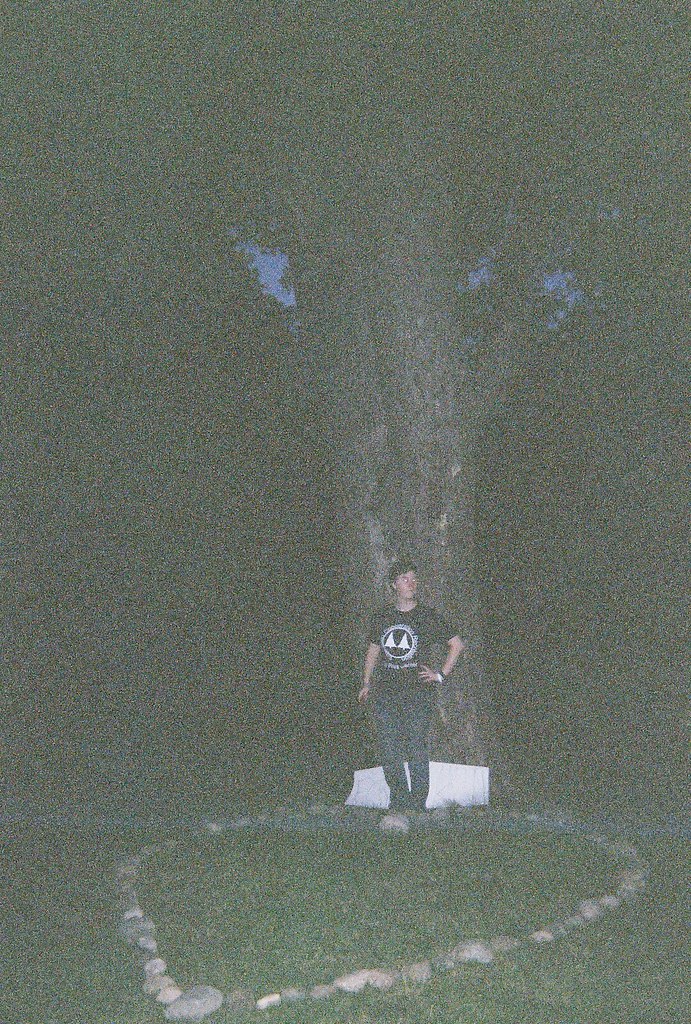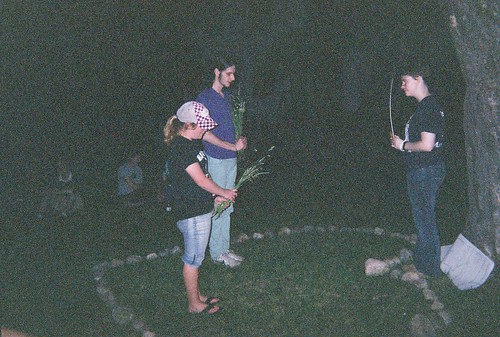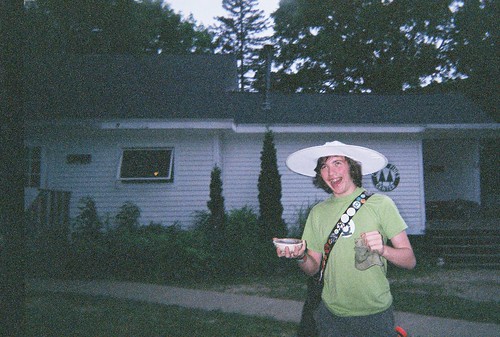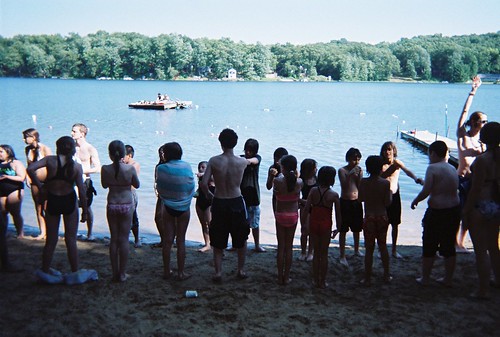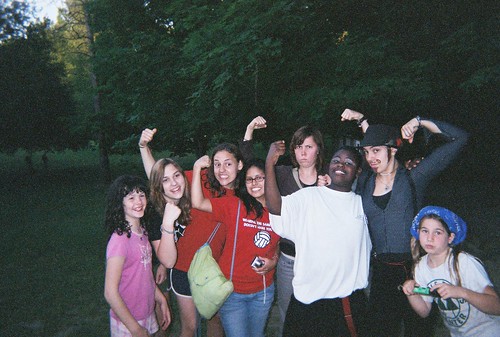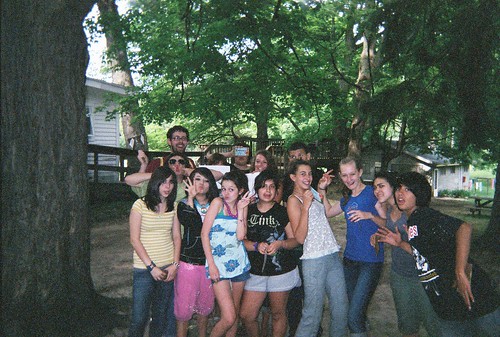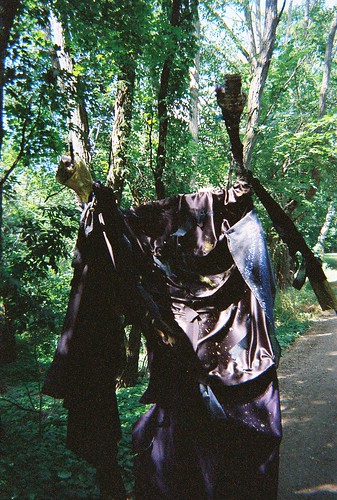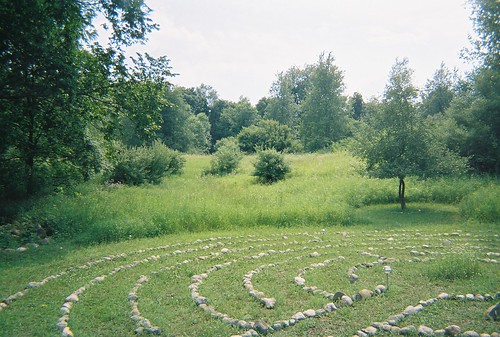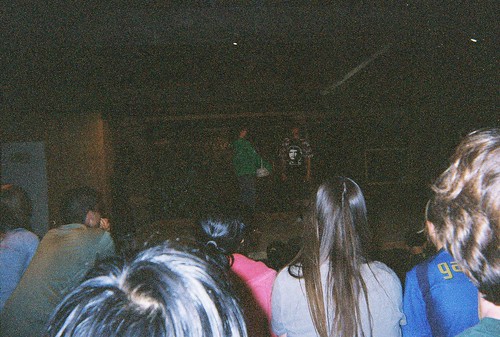 |
| Marwan discusses Al Thawra. |
Thursday, December 31, 2009
Taqwacore and the Real Threat: Interview With Marwan Kamel From Al Thawra
Sunday, November 8, 2009
Cafeteria Workers Prepare for Union Contract Fight
Even though Compass is a Fortune 500 company, with a CEO who makes more than 750 thousand dollars a year, Compass treats the cafeteria workers who make its wealth like the liver they often chop. Low pay, substandard health care, lack of proper training and poor management are some of the complaints of many of the workers at the DePaul cafeteria.
Represented by Service Workers United and Serviced by UNITE/HERE Local 1, the workers contract expires in March and they looked forward to changing DePaul's cafeteria and gaining a stronger contract.
Chanteen Hardaway has worked as a cashier at DePaul's cafeteria for six years, and was nervous before the conference because she had never spoken in public before. During her speech, she broke into tears describing how, “It really hurts me because I know I can't afford a lot of stuff for my kids. I just feel that it's really unfair.” She said, “We need better wages and free health care. I want to take my kids to the doctor without needing to use public aid.” Hardaway emphasized Chartwells' responsibility to its workers, “I shouldn't have to use the government when I work for a company that makes multi-billion dollars a year.”
Over 100 students and community members attended the conference.
Chartwells worker Alan Camacho pointed out that the average wage for Chartwells workers was half the living wage for one person and that many workers had families that they needed to support, “it really impacted me when DePaul was running coat drives and feed the homeless and hungry [food drives], and right there in the student center, in the cafeteria, people's kids are going hungry.”
Camacho explained, “there's someone working here for 20 years and they make the same amount of money I do, and I've been here 4 years.” Further, “the managers get bonuses based on how much money they spend, and if they spend less money [on workers] they get more money [for themselves].”
69 year old Nathan Arnold has been cooking for over 50 years and worked at DePaul's cafeteria for the last 10 years. Arnold explained, “My Academy Award is the smile on your face after you eat one of my meals.” However he was baffled by how Chartwells treated it's employees, “I just didn't understand how people were allowed to get away with certain things. How they treated the employees. I hadn't been here 2 weeks and I heard a supervisor cursing out a pastry chef and a sous chef.”
Arnold told the Conference attendees, “I made more money 30 years ago than I do now. It's sad how the corporate world can take and abuse when we supply their need. We place the caviar on their plate and they shove us crumbs.”
Changes in management cost Quiendolyn Wilkens $400 a week, as Chartwells cut her hours from 45 hours a week to 32 hours a week. She described how after requesting for more hours, management retaliated by cutting her hours more. With two children to raise, she became a “mad black woman on a mission” even though she initially knew little about the union, she was one of the first to become active in it. “It wasn't about me, it was about everybody else that was going through what I was going through.”
According to Wilkens, “My manager can not come down and make up quesadilla just like that., They can not do the work that I do.”
The Union has been able to help workers improve their shop. According to Hardaway, “when the mangers try to fire us for something stupid, we have the union behind us. They [the managers] try to come up with some pretty ironic stuff to fire us about. Some people have gotten their jobs back.”
Camacho described a fight the union had with the managers. Chartwells would hire temporary workers from temp agencies to prevent regular employees from becoming eligible for health and vacation benefits or from gaining overtime pay. When Camacho and other workers confronted management about it, they were threatened, even though the contract prohibited this temp worker practice. After confronting the manager over this issue, the company hired 4 new permanent employees. This is an example of the union fighting for the unemployed in the worst recession since the 1930's.
UNITE/HERE Local 1 researcher Kyle Schafer explains Compass groups wealth.
The cafeteria workers at DePaul have a union contract through Service Workers United. SWU was a joint organizing project through UNITE/HERE and SEIU to unionize food service and cafeteria workers. The different bargaining units are serviced by different SEIU or UNITE/HERE locals, in DePaul's case, the contract is serviced by UNITE/HERE local 1. The Chartwells workers may switch their bargaining agent from SWU to HERE Local 1, as frustrations mount over the weak contracts that SWU negotiated.
In a sign of solidarity, DePaul students who live at the social justice themed Vincent and Louis House cooked lunch for conference attendees, including cafeteria workers who usually cook food for the students.
Arnold was of the initial organizers for the union and stated that he did it “not for the benefit of me, but for the benefit of you the students who are going to need future jobs that your going to need, for my co-workers that are still going to be working in 10 20 years.” An excellent point considering that several baristas at Chartwells were former students at DePaul.
Arnold stated, “I am so proud to see that the students are coming forward with this union and doing something for themselves. We all are the union and together we'll make this world a better place.”
Sunday, November 1, 2009
Coffee and Shifting the Political Paradigm
We had three sizes of coffee cups - in order of smallest to biggest - Tall, Grande, and Alto-Grande.
People often get confused about the names of the sizes. Why the funny Italian names? Why can't we call the cup sizes Small, Medium, and Large?
Have you ever had coffee in Europe or South America? They serve it in espresso sized cups. That's a regular size of coffee internationally. The fact is that the smallest size coffee you can order in the United States is still considered Tall compared to what an actual regular cup of coffee would be in the rest of the world.
This mirror's America's obsession with making everything bigger and eating greater proportions of food. It's not good enough to have a car that gets you around, you need a gas guzzling monster truck. These large coffee cups represent an aspect of American Affluenza and our domination of the world. Only America has the free trade deals and military might to import so much of an upper drug in order to keep it's work force artificially stimulated and artificially attentive.
There are different kinds of people who order coffee. Some only want a little, some want a big caffeine fix. Then there are the undecideds - those who want some coffee, but do not know how much they want.
As a cashier I would prompt those undecideds and ask them what size coffee they wanted. They would hesitate. They didn't want to be extreme and order a 'small' or a 'large' so they would gravitate towards the 'medium' size. However it isn't an actual medium. It's actually quite a large amount of coffee.
Likewise with politics in America. We have shifted so far to the right, that what counts as left wing is actually quite a bit to the right of the rest of the world's left-wing.
Those who don't think about what coffee size they want gravitate towards what they perceive to be the middle. Likewise those who don't think about politics much gravitate towards what they see as the middle - which is not a genuine political center.
Sunday, September 13, 2009
Review of "American Radical: The Trials of Norman Finkelstein"
_______________________________________________________________________________________________
I was at the world premier tonight for "American Radical, the Trials of Norman Finkelstein," a part of the Underground Film Festival at the Siskel Film Center.
Finkelstein was a professor of mine at DePaul University and he has gained fame and controversy for his books critical of the occupation of Palestine. Finkelstein was denied a tenure position at DePaul and I was one of the students who organized protests in support of his bid for tenure. I was a part of the occupation of DePaul President Fr. Holtschneider's office. Finkelstein was a fantastic teacher and an excellent academic.
I was looking forward to this movie, and was glad to see a large crowd at the opening including many DePaul Alums who knew Finkelstein and participated in rallies in support of his tenure bid. Unfortunately the directors David Ridgen and Nicolas Rossier were unable to make this screening, but one of them is supposed to be at the screening later this week.
The movie is a deeply personal one and is almost psychological in its approach. While it covers Finkelstein's politics and research, it really only skims and briefly touches upon his books. I suppose it would make a dull movie to discuss proper citation and research, something that much of Finkelstein's work looks at, exposing fraudulent Isreali apologists. However I would have enjoyed the movie to describe the occupation of Palestine a bit more so audiences would understand it.
What I did enjoy in this documentary was the personal history of Finkelstein's family. I knew the basics, that his parents were Holocaust survivors, progressives, and that he gained a great deal of his integrity and willingness to speak for radical causes from them. It was great to see photos of the family raising Norman and his siblings in New York, to hear audio of his mother, to really understand the impact that his parents experience had on him.
The footage of Finkelstein's lectures in Canada are classic Norm. While he is very gracious, allowing those who disagree with him to speak, he is willing to raise his voice to assert that he will not let those who shed "crocodile tears" for the victims of the Holocaust to use his parents memory to justify the subjugation of Palestine.
I wish there was more footage on Finkelstein's academic battles, from his battle to have Princeton grant him a PhD after writing a dissertation that was critical of Zionism, to the denial of Tenure at DePaul. The movie covers those events, but does not go into detail.
One thing that particularly bugged me was Alan Dershowitz's appearance in the movie. Dershowitz is a Law Professor at Harvard University, and a minimalist and apologist for the worst kinds of occupation and torture committed by the US and Israel. Dershowitz has spoken in support of legalizing torture in the US, and offering torture permits for US soldiers to interrogate prisoners by sticking red hot needles under their finger nails. Dershowitz actively lobbied DePaul University to deny tenure to Finkelstein.
What irritated me about Dershowitz's appearance in the movie was that he showed himself to be a complete idiot and a pathological liar. I don't mind if Dershowitz wants to show the world what a fool he is by appearing in the movie, but he repeated several factually inaccurate statements. While Finkelstein has done an excellent job of exposing Dershowitz's false claims in the book "Beyond Chutzpah" I feel a need to assert the accuracy of the Dershowitz's statement on how Finkelstein was hired at DePaul.
Dershowitz claims that it was radical left wing faculty who wanted to bring Finkelstein into DePaul. I have been working on a history book about DePaul, and all the available evidence I had shows that it was students who originally brought Finkelstein to speak at DePaul, and it was students who suggested to Finkelstein to apply for the open position in the political science department. It was students who rallied to support Finkelstein obtaining a tenure track position, and students who rallied in support of Finkelstein obtaining tenure. There were no anti-Finkelstein student rallies at DePaul. Many conservative students who took his classes came to like him and found him to be a fair and challenging professor.
Of course Dershowitz could have found that out, if he did his own research on the subject.
The film follows Finkelstein to Lebannon and Palestinian refugee camps, interviewing family friends in Palestine and Palestinian youth who are inspired by Finkelstein's speeches to look at Jews as potential partners in peace instead of as enemy occupiers. It mentions Finkelstein's ban from Israel, but I would have liked to seen actual footage.
One thing that the movie captured well is Finkelstein's self-doubt and yet his integrity. He is constantly wondering if he should not 'give them something to use against me' or if he should simply tell the truth. He is a truth teller to the point where it has ruined his academic career.
Two of his greatest lines in the movie were responding to personal criticism leveled against him. To those who suggested that he is maladjusted and unable to come to terms with his Jewish identity, he responds that even if that were true, what consequence does it have on his writings and historical fact? If Einstein had a maladjusted personality, what consequence would it have on his physics? He also addressed the criticism of his tone. Often academic supporters of his will state that they agree with Finkelstein's research, but they disagree with acerbic tone which he presents it. Finkelstein responds that there are certifiable war criminals teaching at major universities, people like Henry Kissinger and Donald Rumsfeld, so why should his tone be targeted unless it is because he is exposing ugly truths?
I wish the movie touched on the wider witch hunt against left wing professors in America. The fact is that Finkelstein is only one of many academics who are being targeted by the right wing, including Ward Churchill, Bill Ayers and others.
I enjoyed the movie. It was sympathetic to Finkelstein without putting him on a pedestal. It showed his personality, his humor, his anger and his sadness well. I hope it will lead people to discuss Norman Finkelstein, and his contributions to truth and justice. Finkelstein doesn't describe himself as pro-Palestinian but rather pro-truth and justice.
Discussion with the Director
I spoke with one of the film's directors, Nicolas Rossier, after the films second showing in Chicago. It was great to talk with him, I could tell he took his role as a documentary film maker serious. He explained that David Ridgen and he had begun filming Finkelstein several years earlier, first just an interview for a documentary, but as they found him to be an interesting personality, they continued to film him, uncertain of what they would use the footage for. After Finkelstein was denied tenure and students protested, they realized that they needed to put the footage together because this was a personality and a story that people needed to know.
I was able to talk to Rossier about a few of my concerns with the movie. I was concerned that the movie was sympathetic to Finkelstein the man, without agreeing with his politics. I asked Rossier about this and he said that they specifically did not want to make a propaganda piece for Finkelstein. He discussed how Alan Dershowitz had a movie made about him that was nothing more than a propaganda film. Taking it's name from Dershowitz's plagiarized book "the Case For Israel." It regurgitated Dershowitz's claims and failed to provide anything beyond a platform for Dershowitz's falsehoods.
Rossier explained that they didn't feel like now was the right time for an outright pro-Finkelstein movie. Rossier, a Switzerland native who lives in the US, claimed that making movies against the Vietnam war would have been difficult to make during the actual war, but that now that time has passed, Americans have come to accept the immorality of the war. He said that maybe 20 years from now, a movie vindicating Finkelstein would be made.
The more I think about this, the more I'm skeptical about that premise. There were several award winning anti-war documentaries that came out during the Vietnam war such as Hearts and Minds, In the Year of the Pig, and Winter Soldier. Further, I'm not so sure that that Americans have really come to accept the immorality of the Vietnam war. This despite being confronted with the actions of the US military in Vietnam during and ever since the war.
I feel like the 'American Radical' falls in with a number of other films about radical leftists that while sympathetic with them, do not justify them or defend them. The comparison I made was that "The Case for Israel" is 'Inglourious Basterds' while 'American Radical' is 'The Baader Madoff Complex.'
Why is it that Tarrantino's 'Inglourious Basterds' can revel in it's violence and historical inaccuracy, while a movie like 'The Baader Meinhoff Complex', which is also about shooting Nazi's, has to chastize the revolutionaries. The difference between Brad Pitt and Baader and Meinhoff is solely in their ideology. One is a hillbilly American who leads a squad of ass kicking Jews, while the other two are Communists trained by the Palestine Liberation Organization. One is praised as an American hero, the other two become villains.
'American Radical' helps a great academic become well known, but I still feel that there needs to be a movie that outright defends Norman Finkelstein.
http://www.americanradicalthefilm.com/
Wednesday, September 9, 2009
Labor Day 2009 Wrap Up
I do not recall Chicago having very active Labor Day's in the past. One year I was in Pittsburgh and attended their Labor Day Parade- it was fantastic. Every union came out to march, and crowds lined the sidewalks to watch the parade.
This last labor day was very active for me in Chicago.
I began by attending the Congress Hotel Picket Line. The workers there, members of UNITE/HERE Local 1 have been on strike for the last 6 years, as they struggle for decent health and pay from the hotel. Dignitaries on hand included Governor Pat Quinn, Jesse Jackson, Author and Minister CJ Hawkings and Aldermen Fioretti and Preckwinkle. The politicians led a delegation inside the hotel to speak to management and to ask that the Hotel find a settlement with the union.


picket line
picket line
picket line
After the rally at the Congress Hotel, I traveled over to Federal Plaza to take part in the immigration Rally.
Video of the march entering federal plaza.

Coffins representing the number of deaths on the border

Children in chains representing the criminalization of immigrant youth.

SK hand tools employees, members of Teamsters Local 743 who are on strike after their employer canceled their health insurance without telling them.

Photo of the crowd at Federal plaza.
A Video of the crowd at Federal plaza.
After the Immigration Rally I took the CTA to the South Side of Chicago, historic Pullman, for the annual Labor Day Picnic and Rally. On the ride there I spoke with one of the founders and leader of the Workers Party of Belgium. Pretty cool.

The crowd at Pullman.

Groups that tabled at Pullman.

Jesse Jackson Jr. speaks to the crowd.
Jesse Jackson Jr speaks to the crowd.
Armando Robles of the United Electrical Workers Talks to the crowd.
A speaker discusses labor disputes at Petes Food Market.
A speaker discusses the Latino Union.
Rich Berg of Teamsters 743 speaks.
Jesse Jackson speaks to labor day rally.
Solidarity Forever is sung.
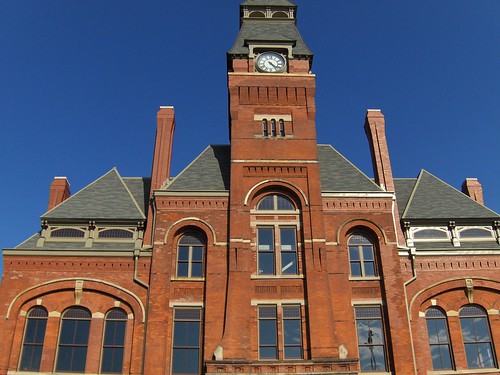
Historic Pullman building.
Thursday, August 27, 2009
The University of Chicago is the World of Warcraft of Chicago Schools
Temp agencies are notorious for substandard pay, benefits, and hours. They are often used instead of full time, union workers. However as economy has been driven into the ground by wall street greed, many are finding themselves with no other option than to seek temp work.
One assignment I was sent to was for the Chicago Public School's Office of Literacy. The office was coordinating an event where elementary school teachers would be trained on how to use their school books by the private corporations that make the books. My job was to help teachers park, set up lunch and help check teachers out. Not tough work, but it struck me how odd the whole thing was.
If I were a teacher, I wouldn't want some corporation to tell me how to teach. Teachers are dedicated public servants, who are interested in educating the youth, while this book company cares only about its profits.
When the temp job was finished and I was able to go about my day, I decided to head down to the University of Chicago. I am interested in entering Graduate School and wanted to speak to someone in the History Department to ask about their program.
I got off the temp job at 3 and thought that, like most other offices, they would close around 5. When I made it to the office at 4:15, I saw a sign posted on the office door that said that the office would close at 4:00 pm during the Summer. You can imagine my frustration.
As I wandered around the campus, unsure of where or what to do next, I marveled at the Gothic Buildings, the Ivy Growing up the sides of buildings, the stone sculptures of knights and maidens around the windows, and the gargoyles crouching from the rooftops. It looked oddly medieval in a city that is known for its industry. Instead of railroads, slaughterhouses and steel mills, it was sheer fantasy.
I also noticed that the doors to the buildings only had doors on the inside of the quad. There was no street access to the buildings, but you had to be inside the green park like quad to enter the buildings.
I came to the realization that the University of Chicago has little, if any, connection with reality. It is the World of Warcraft of Chicago academia. Intellectually stimulating, yet designed to keep you on your butt doing nothing to fix the problems of your life and of the world. The University of Chicago isn't going to do anything to give Chicago teachers freedom, in fact the school eradicated it's education department because it was to practical. It isn't going to help unionize temp workers, the school was the birthplace of neo-liberalism.
What we need are schools that teach people practical lessons as well as the theoretical understanding of the world. Philosophy and practicality. Electrical work and Anthropology. Farming and Neichze. Janitorial Maintenance and Chomsky. Only then will we have an education that develops people for the real world.
Saturday, August 22, 2009
Beggers and Living at Home on the Rise
It's scary to think that a year ago I would see maybe one beggar on the walk from the Metra to the Blue Line Jackson stop.
Today, I saw five beggars on that walk from the Metra to the Blue Line alone. I saw more on the train and in other neighborhoods.
I also talk to more and more of my friends who are forced into living at home, living in the suburbs because they can't afford rent while jobless in the city. They pray that their parents are able to maintain their jobs, while my friends social lives are put on hold living with their parents.
Wednesday, August 19, 2009
"We Hold All Applications for 6 Months."
Most of us have muttered, "bullshit" under our breath. We knew that those applications were headed straight for the paper shredder.
Today I had proof of such disingenuous behavior from employers.
I had filled out an application for a coffee shop at a major food vender in June. I told the manager that I was going to be a camp counselor for the summer and would be back in August for when the school season picked up and they got busy.
That's when I head the dreaded lines, "We hold all applications for at least six months and will consider you for anything that comes up."
I came back to the coffee shop last week. Reminded the manager that I had already filled out an application and told her that I just wanted to let her know that I was back and ready to work. They called me back and scheduled an interview.
I walked in ready for the interview, when I was told that they had 'misplaced' my application and needed me to fill a new one out.
Misplaced. My Application. Uh-huh. Right. Maybe I should misplace my interview, that would really help me get the job right? Alas, I am only a proletariet, with nothing to sell except my own labor. If I misplaced them, they would simply hire some other poor worker, but they are able to misplace me and there is nothing I can do except smile and compliment their hair. The unfairness of it all should gall anyone with any sense of a decency.
To all the job recruiters out there, treating people like dirt, making the decisions about who gets to live in a nice apartment and who gets to sleep in the ditch, understand that one day, when the movement is strong enough, we will have universal employment in this country. That will be the day scum like you will need to be retrained to do something productive for society.
Tuesday, August 18, 2009
Summer in the Cooperative
I just returned from spending my summer at Circle Pines Center, a cooperative in Michigan which runs a summer camp program. I was a camp counselor for 13-17 year olds. I had a great time.
Circle Pines was formed in 1938, near the end of the great depression. It has always been associated with left wing groups like the Unitarian Church, the socialist and communist parties, labor unions, anti-war activists, civil rights groups, feminists and queer activists. The famous left wing folk musician Pete Seeger performed at Circle Pines in the 1950's and many other activists have visited or sent their kids to camp at CPC.
I first heard about Circle Pines Center through m friend Rob, who invited me to one of the coop's 'workbee weekends.' These are all ages camp outs where in exchange for chipping in with some of the chores and projects at Circle Pines, campers receive a discount for camping, eating, staying in the cabins. I got up at camp and was driven out into the forest on the back of a pick up truck. We stopped and I hopped off, and was handed a chainsaw and told that we would be chopping down dead trees for fire wood. They had unleashed my inner Bart Simpson.
I was interested in being a camp counselor at Circle Pines and the more I talked to my radical friends who were parents, I realized that many of them sent their kids to Circle Pines summer camp. With the down turn in the economy and the struggle to find reliable work, I had a free summer, and so decided to apply to work as a counselor this year.
We had a week of oreintation before the campers arrived. We were trained on first aid, nonviolent conflict resolution, and everything else we needed to know before the campers arrived.
Once the campers arrived and camp got going, it was very busy. We would have work projects in the morning. Campers would be able to pick from helping in the camps organic garden, cleaning the nature trails, contruction, or nitty gritty cleaning of the farmhouse, kitchen and bathrooms. This was intended to help the kids contribute to the cooperative and to learn cooperative work.
After lunch we would do singing until chores were done. We would sing old labor songs like Joe Hill and Solidarity Forever as well as 60's hippie songs like Imagine and The Times They Are a'Changin'. This was followed by a one hour rest period before the afternoon activites started. Everyday there would be different activities for the kids to participate in such as: arts and crafts, the beach, board games, sports, and discussion circles about different issues. We would discuss relgion, unions, the war, racism, and the kids were very smart and had insightful things to say about all of these issues.
After dinner there was usually an activity that reflected the camps mission. We would have 60's radicals like Larry Plamondon speak to the kids about protesting against the Vietnam war, or we would do activities that taught the kids about the imporance of fair trade, unions, and the food chain. I led an activity that taught the kids how to be a canvasser or community organizer. They had to go talk to staff members, each staff member was a different voter, with a different story, in terms of being a Republican or Democrat or what issue mattered to them. Then the campers would act like Obama canvassers and attempt to gain the voters support. We also did folk dances and dance parties. Many of the kids would cross dress at the dance parties, the camp was very Queer friendly.
The campers were pretty ridiculous. So full of energy, and so smart for their ages, they kept us counselors on our toes. I remember one camper, when he didn't want to do chores, he would talk about forming a union and going on strike to protest the chores that campers had to do.
The families of the kids were fantastic. Many of the parents were union members, or union organizers. Some were college professors for a number of progressive subjects. Some were gay or lesbian couples or immigrants from far flung countries. There was one camper whose grandfather fled from the Pinochet dictatorship in Chile to Panama, and was forced to flee there are the US invasion of Panama. Another campers grandfather was a Holocaust survivor. One girl's grandfather was a Christian Palestinian, who was evicted from his home by the Israeli Defense Forces, a victim of the Nakba.
My apologies for the quality of the photos and lack of video. My digital camera is broke and I was forced to use disposable cameras.
On Pride Day, we hosted a wedding in solidarity with all the parades we were missing.
Here I am with Batman, one of the goats we watched for the summer.
During orientation this great bluegrass band performed for us.
One of the CIT's outside of the farm house looking ridiculous.
Youthies hanging out in the lodge. The Youthie Lodge featured paintings on the wall of famous icons such as Bob Dylan, Frida Kahlo, Ghandi, Malcolm X and Dr. Martin Luther King Jr.
Youthies hanging out in the lodge.
Here I am working on the construction work project, building a garden shed for the organic garden.
The floor of the garden shed.
Campers and Counselors singing during the after lunch sing alongs.
The folk dance was a lot of fun. I dressed up as a "Country Punk" with a flannel shirt, studded belt, fro-hawk and riped jeans.
Water Balloon toss at the beach.
Campers and Counselors being macho.
The folk dance.
More after-lunch singing.
Here I am with the youthies.
All camp photo.
The Sandman puppet I made. During the first session, all the campers and counselors made puppets and held a puppet parade for the parents who came to pick them up. My puppet was inspired by the comic book by Nail Gaiman. I was actually inside that giant puppet. The arm moved versy realistically and the head was a plastic bottle, filled with sand and decorated on the outside.
A counselor and his puppet.
Another counselor paid tribute to the goats with this pyschedelic goat puppet.
The dining hall in the farm house. The food every day was great. Most of it was vegetarian, and vegan options were available. Most of it was organic and local. The rare meat that was served came from local free range organic cows, pigs and chickens, so that one cook would tell us that they were, "happy cows." After the campers left, the counselors got to visit a dairy farm, which was pretty interesting. Even though these cows were not confined to cages, and were organic, etc, they still did not seem very happy.
Counselors and campers.
During the Youth Institute, we made a Zine. It contained lots of political musings, inside jokes, and cool art.
The Cover
The Comic Strip I drew.
My Music Recommendations for the kids.
All camp photo.
Sawing for the garden shed.
Being out in nature for the summer was wonderful. We would see were wild animals like deer, racoons, frogs, squirrels and at night you could hear coyotes howling. I woke up one morning to find a pack of wild Turkeys outside my cabin! I remember that one day a hive of bees was swarming all over the soccer field. Apparently a queen had been born and they were begining a new hive. Over an hour, the swarm condensed itself onto a single branch. The plant life was incredible as well. Wild Rasberry's would grow along trails, vines would grow off of tall trees, and even hops grew on trees.
The Western Look out.
A nice trail.
The Labrynth was a cool meditation tool that was recently built.
The organic apple orchard.
A field in the back 80.
Using the nail gun for the garden shed.
Pine trees.
The finished garden shed.
Youthies!
Every year at the end of camp, the campers perform a folk opera. They spend two week practicing, writing, and working on the performance. The opera usually satirizes camp and the counselors through song, dance and acting. This year's was particuarly great as they sang songs like "My stinky hippie camp" to the tune of My Humps by the Black Eyed Peas "They Truth and Dared and They liked it" to the tune of I Kissed a girl and I Liked it. To read the script to my scene, scroll to the bottom.
One of the campers playing me in the folk opera.


The final song in the folk opera.
Photo courtesy of Clare Stamler-Goody. At the end of each session, counselors give out awards to campers. The awards are usually quite creative and funny. Our Youthies were very cool and made awards for the counselors as well. I received a wood ax that had written on it "Most Brootal Counselor Award" for my love of Heavy Metal. I also received the "Political Punk Rocker Award."
We also did something called "Secret Angels." Everyone at camp would pick a name out of a hat, and would secretly give small gifts or acts of kindness to thier "ignorant mortal." At the end of each camp session, we would find out who our secret angels were.
I would recommend that other progressives who are looking for a fun summer camp to send their children to, consider circle pines. If you are not sure about it, or do not have children, visit for one of the work bee weekends. The Apple Cider Weekend is very popular.
Below is the Text of the Folk Opera for the Scene my Charecter was in. Script by the Folk Opera Staff.
___________________________________________________________________________________________
Youthie Scene:
(Heidi enters, skipping down a path)
Heidi: On my way to Grandma Kristen’s house. I’ve got to deliver the hair straightener to her, so she can subdue the Youthies. This sure is a long way from Pittsburgh. This path is taking too long. Maybe I can take a shortcut through Devil’s Hill, er Youthie Beach path. (She continues skipping, Matt jumps out at her)
Matt: Hey there! Did you realize how much money our country spends per day on the war?
Heidi: You frightened me!
Matt: You’re telling me! You wanna be frightened? Read the news.
Heidi: Who are you?
Matt: I’m Matt the “Big bad wolf,” if you will. But the wolf part is really a metaphor. Sort of like Werewolf by Night.
Heidi: (cautious) I see, well, I’ve got to get to my Grandma’s House and-
Matt: Lemme ask ya, did you ever think about how Batman was a fascist? Think about it Batkids goose-stepping through Gotham…
Heidi: I’m not sure I follow. But I’ve really got to get going.
Matt: I’ll walk with you. Perhaps I could recommend some music for your journey. What kind of music are you into? Heavy metal, black metal, folk metal, gospel metal…
Heidi: I’m really more of a top 40 kind of girl… Oh, here we are at Grandma’s! Grandma, I’ve never been so happy to see you!
Kristen: Little Red Heidi Hoody, I’m so happy you are here! I was just finishing a poem and knitting a sweater for my sweetheart.
Heidi: Jazzy?
Kristen: Jazzy? Who’s Jazzy? These are for Naughty Boy. Who’s this furry friend you’ve got with you?
Matt: I’m the Big Bad Wolf-Matt. From Chicago, the best city in the whole wide wide world.
Kristen: Well it is very nice to meet you. Heidi hood, do you have the object?
Heidi: Yup, I’ve got it right here. Right here with my make-up kit!
Matt: Do you know that those poisonous cosmetics in your bag are the cause of death for thousands of innocent animals? In the words of Rousseau-
Noland: Hi there! I’m Nolan, the Poetry Guru. I’m here to save you from an oncoming discussion of capitalism and it’s effects on the Punk Revolution!
Heidi: Thank God. He was starting to make me feel dumb. But that’s nothing new here.
Kristen: Oh Heidi, don’t say that. Let me show you this cute mushroom I found to cheer you up. Of I could tell you a story about snow.
Matt: Don’t you guys think the Youthies have had a little too much alone time? We should go break up their touchy-feely time in the lodge and get them to brush their teeth.
Nolan: I’m sure that with my good looks, the girls will come running right out.
Heidi: I think we should give them a little more time.
Matt, Kristen, and Nolan: NO!!!
_____________________________________________________________________________________
Youthie Song to I Kissed a Girl
Matt: This was never the way I planned
Tree-huggers annoy me
I’ve got my brave guitar in hand
To burst the screen door
Kristen: It’s time to go brush teeth
Just get up off the couch
Youthies: We really don’t want to
We want to make-out
Chorus: They truth, their dare it, they like it
With the smell of the pee couch
They licked an arm just to try it
Hope the counselors don’t mind it
Youthies: It was so gross, it was so great
Counselors: Hope they don’t go to bed too late
All: They truth, they dare it, they like it
Nolan: Step over Gabe, I’m the new hottie
No one compares the girls want me
Heidi: Mosquitoes, mice, and Matt’s Beard
Hippie camp is so weird
Counselors: These kids they just won’t leave the lodge
Chorus: They truth, their dare it, they like it
With the smell of the pee couch
They licked an arm just to try it
Hope the counselors don’t mind it
Youthies: It was so gross, it was so great
Counselors: Hope they don’t go to bed too late
All: They truth, they dare it, they like it





